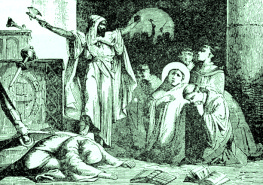Lives of the Saints
Our Models and Protectors
Spiritual Bouquet:
October 5

Saint Placid
Martyr
(515-541)
Saint Placid was born in Rome, in the year 515, of a patrician family, and at seven years of age was taken by his father to the Benedictine monastery of Subiaco, recently founded, to be educated. At thirteen years of age he followed Saint Benedict to a new foundation at Monte Cassino, where he grew up in the practices of a wonderful austerity and innocence of life.
He had scarcely completed his twenty-first year when he was chosen to found a monastery at Messina, in Sicily, upon some estates which had been given by his father to Saint Benedict. He spent four years in building that monastery. There miracles made him known, and it was said that his humility was so perfect and had such charm, that it earned for him the affection of all. He could not see a poor man without hastening to aid him. One day he cured all the sick of the island at the same time, when they were brought and assembled before him for his benediction.
The fifth year spent by the monks in Messina had not yet ended when a band of Saracen pirates who had already killed a great many persons, burnt everything to the ground in 541. They then put to a lingering death not only Placid and thirty monks who had joined him, but also his two brothers, Eutychius and Victorinus, and his holy sister Flavia, who had come to visit him. The entire flotilla of the invaders perished when these barbarians left the island, amid a sudden storm; although they had a hundred ships and were 16,800 in number, not one ship or passenger survived. A religious who had escaped notice wrote to Saint Benedict an account of the massacre, after burying the martyrs. Saint Placid was the first Benedictine martyr, and the monastery of Messina, which was rebuilt not long afterwards, was henceforth known by his name.
Reflection: Adversity is the touchstone of the soul, because it makes manifest the degree of its virtue. One act of thanksgiving when matters go wrong, is worth a thousand thanks when all things please us.
Les Petits Bollandistes: Vies des Saints, by Msgr. Paul Guérin (Bloud et Barral: Paris, 1882), Vol. 12; Little Pictorial Lives of the Saints, a compilation based on Butler's Lives of the Saints and other sources by John Gilmary Shea (Benziger Brothers: New York, 1894)